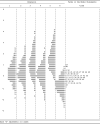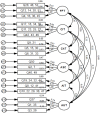Translation, validity, and reliability of the European Portuguese version of the Touch Experiences and Attitudes Questionnaire
- PMID: 37033723
- PMCID: PMC10078461
- DOI: 10.7717/peerj.14960
Translation, validity, and reliability of the European Portuguese version of the Touch Experiences and Attitudes Questionnaire
Abstract
Background: Positive touch experiences have proved to be extremely important throughout our lifespan, with cascading effects on our social life. However, few questionnaires are available to measure attitudes and experiences of touch in the Portuguese population. This study aimed to translate and validate the European Portuguese version of the Touch Experiences and Attitudes Questionnaire (TEAQ), as a reliable and valid instrument to measure different aspects of affective touch experiences and attitudes.
Methods: Therefore, an online sample of 384 (299 females and 85 males) participants, aged between 18 and 75 years (M = 24.59; SD = 9.56) was collected. Multidimensional Rasch model and confirmatory factor analysis were carried out, and also reliability and convergent and discriminant validity were determined. In addition, we examined sex differences in attitudes and experiences of touch.
Results: Results showed good fit indexes for the 52-item six-factor model structure (friends and family touch, current intimate touch, childhood touch, attitudes to self-care, attitudes to intimate touch, and attitudes to unfamiliar touch). This instrument also showed good reliability and acceptable convergent and discriminant validity. Significant sex differences were found, with female participants reporting more positive touch experiences (including childhood touch, friends and family touch, and current intimate touch) and a more favourable attitude to self-care, with males showing a more positive attitude towards unfamiliar touch. Regarding attitudes towards the intimate touch, scores for both groups were comparable.
Conclusion: Overall, the European Portuguese version of the TEAQ presented good psychometric properties and appears to be a reliable and valid self-report measure, being a useful and beneficial instrument in research and clinical settings.
Keywords: Affective touch; Interpersonal touch; Positive touch; Psychometric properties; Social touch; TEAQ; Validation.
©2023 Pereira et al.
Conflict of interest statement
The authors declare there are no competing interests.
Figures



References
-
- Arbuckle JL. IBM® SPSS® AmosTM 22 User’s Guide. Chicago: SPSS, Inc 2013.
-
- Benenson JF, Morash D, Petrakos H. Gender differences in emotional closeness between preschool children and their mothers. Sex Roles. 1998;38(11–12):975–985. doi: 10.1023/A:1018874509497. - DOI
-
- Berghout Austin AM, Braeger TJ. Gendered differences in parents’ encouragement of sibling interaction: Implications for the construction of a personal premise system. First Language. 1990;10(30):181–197. doi: 10.1177/014272379001003001. - DOI
-
- Boehme M, Van de Wouw M, Bastiaanssen TFS, Olavarría-Ramírez L, Lyons K, Fouhy F, Golubeva AV, Moloney GM, Minuto C, Sandhu KV, Scott KA, Clarke G, Stanton C, Dinan TG, Schellekens H, Cryan JF. Mid-life microbiota crises: middle age is associated with pervasive neuroimmune alterations that are reversed by targeting the gut microbiome. Molecular Psychiatry. 2020;25(10):2567–2583. doi: 10.1038/s41380-019-0425-1. - DOI - PubMed
Publication types
MeSH terms
LinkOut - more resources
Full Text Sources

